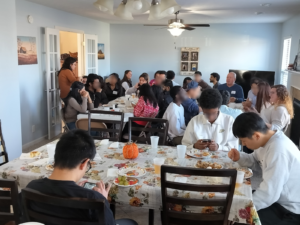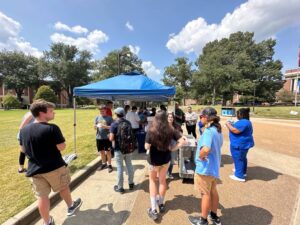In marriage counseling I always advise couples to know their spouses love language and seek to express that love language to their spouse as often as possible. This helps one’s spouse feel seen and loved by their partner. This can often be difficult as we often give the type of love that we personally desire. My love language is words of affirmation and quality time, my wife’s love language is acts of service and quality time. Acts of service is the lowest on my love language, often I can view acts of service as just things that have to get done. While I may not feel exceptionally loved by acts of service my wife sees it as one of the greatest acts of affection that I can show her.
While this is advice I typically pass on to couples in premarital counseling, I also believe there is great value in knowing our students love languages. This was driven home for me while serving at our BCM’s Spring Formal. My family and I spent all day cooking so the students would not have to and could take formal pictures with their friends. We filled up drinks for them, served them their food, and helped clean up so they could enjoy the evening. One student who has been hard to crack in loving him thanked me profusely throughout the night telling me how much he appreciated all that my family and I had been doing. I had been giving this student leader words of encouragement and quality time all year, yet he saw my love ultimately through my act of service. What are your students love languages?
Quality Time-
Hebrews 10: 24-25: “And let us consider how to stir up one another to love and good works, not neglecting to meet together, as is the habit of some, but encouraging one another, and all the more as you see the Day drawing near.”
I feel this is a necessity of discipleship. I have heard it said “quantity time leads to quality time”. I understand what the quote is trying to convey, but I would push back on this for two reasons. First, are we intentional with our time? Are we asking questions to get to the root of a students issue, do we remember the previous weeks conversation and remember to follow up about their prayer request? Do students feel seen in the time you spend with them?
Second, are we spending time with students not just in the word and prayer (although that is some of the best quality time there is), but doing things that say “I enjoy your company and I like being around you”. Some of the best conversations I have ever had were while kayaking or rock climbing with students. These moments help convey to them “I love you and I like you”. God walked with Adam and Eve in the garden, can you think of anything that shows the value of quality time more?
Words of affirmation–
1 Thessalonians 5:11: “Therefore encourage one another and build one another up, just as you are doing.”
Gifts-
James 1:17: “Every good gift and every perfect gift is from above, coming down from the Father of lights, with whom there is no variation or shadow due to change.”
Matthew 7:11: “If you then, who are evil, know how to give good gifts to your children, how much more will your Father who is in heaven give good things to those who ask him!”
I have had many students who come from very low income backgrounds and families. Even the simple gesture of a free coffee or a meal can go a long way. I try to be more intentional with my gifts though. Usually the gifts are to say thank you. Typically I give an engraved watch or compass to our presidents at the end of the year. Something that really shows them how much they are valued.
These gifts can truly show the love and generosity of the Father. I don’t do this often but I have on occasion helped a student I know to be hardworking but who is struggling with their rent. I use it as a chance to point out how generous God has been to me and my family and ask they be generous to those that are in their lives.
Acts of service-
What are ways you can lead the charge in serving your students and your campus.
I try to have a balance of the attitudes of Mary and Martha in my own life and in our ministry. Let’s be honest, our ministries would be a lot more difficult without the Martha’s of the world. But the times when new students are around I need to be leading the charge of evangelism. After the event is over though I want to lead the charge in serving.
Matthew 5:16: “In the same way, let your light shine before others, so that they may see your good works and give glory to your Father who is in heaven.”
Find ways to serve your students. There is a principle of “if it can be given away, give it away”. We have the students that live in the building clean it, I want to spend my time on more important things. At the same point I want to lead by example and serve in what others may consider the lowliest ways. These moments often show how much you love them and love the ministry. One word of advice though: try not to do these tasks by yourself. Some of my favorite moments have been teaching young men how to work with their hands and having great conversations about Christ while doing so.
Physical touch–
Luke 15:20: “And he arose and came to his father. But while he was still a long way off, his father saw him and felt compassion, and ran and embraced him and kissed him.”
I will say on the front end of this section, be EXTREMELY careful with showing the love language of physical touch. While Paul encourages his followers to greet one another with a holy kiss, I would not advise that in our society. I would honestly suggest keeping things to hugs, side-hugs, pats on the back. The King James translation of 1 Thesolians 5:22 says to, “Avoid all appearance of evil.” We should look at every encounter we have and ask “how would this look to others?”.
We also must be aware that many people are uncomfortable with any physical show of affection. We had a student a few years ago that came up and gave backrubs to basically anyone, it was weird and had to be addressed. He wasn’t trying to be creepy, but that is how it came across. To the students who receive love through physical touch though it can be really meaningful. It means a lot to me when a mentor pats me on the back during a sermon or when my dad laid his hands on me in prayer during my ordination. I had a student that laid his head on my shoulder as I prayed for him and I knew this was his way of expressing his love and trust in me. For those students who receive love this way, express physical touch in healthy and appropriate ways, but again just be cautious with this one in particular.
John 13:35 says, “By this all people will know that you are my disciples, if you have love for one another.” Let us love one another well.
Takeaway questions:
What is your love language?
What love language comes most naturally for you and your staff to express to your students?
Do you know the love language of your leadership?
What are some ways you can show each of these love languages to your students and staff?
Written by Daniel Johnson, Director of University of Kentucky BCM






